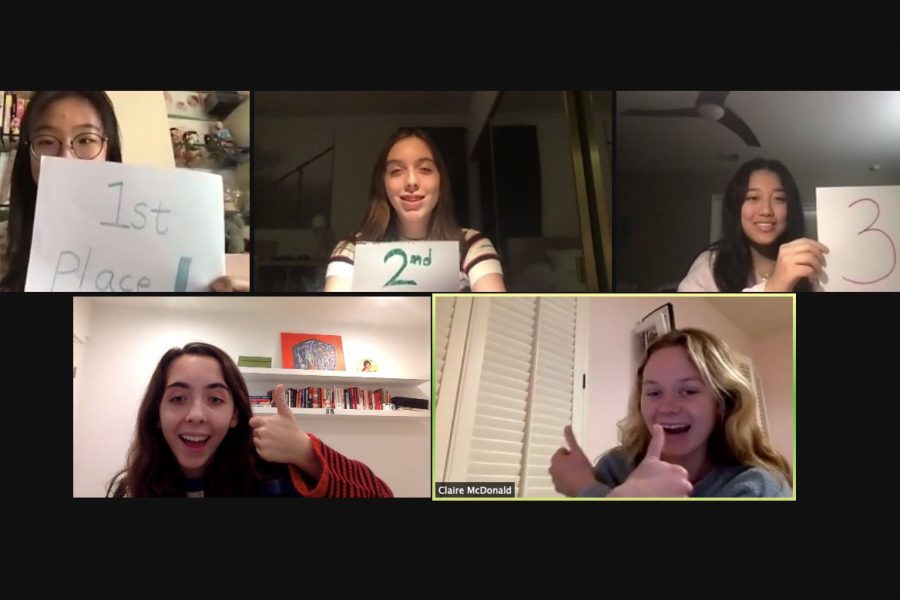The Veritas Shield announces the winners of its writing contest
According to Wallaroo Media, over 60 % of TikTok users belong to Generation Z.
For the Veritas Shield’s first writing competition, we asked the Flintridge Sacred Heart community to submit articles that considered whether TikTok has had a positive or negative effect on Generation Z. We received over 20 responses, all from passionate Tologs eager to express their opinions on this heavily debated subject. We read stories about the impact of virtual communities in this time of isolation and stories about the app’s ability to give users the confidence to freely express themselves. At the same time, we read stories about reckless influencers avoiding responsibility for their actions and toxic algorithms engendering hatred. As we reviewed our fellow students’ pieces, we were reminded of the profound impact technology has had on our generation.
While we were truly entertained and inspired by all of our submissions, three articles in particular stood out to us because of their nuanced claims and vivid details. Below, you can read our first, second and third place submissions.
First Place
“TikTok makes your day” – Wendy Wang ’23
“2:00 – 3:00 p.m., English creative writing; 3:00 – 3:30 p.m., history reading; 3:40 – 5:00 p.m.…” I stopped writing and frowned. “What did I do during that one hour and 20 minutes?”
As I stared at the blank below the time slot, my brain became still. Usually, at the end of a day, I wrote my journal to look back on what I did, for I enjoyed making every day full and happy through my neat handwriting. To recall the events between 3:40 and 5:00 p.m., the first thing I did was open my phone, which always keeps track of my life.
So, I opened the “screen time management” on my phone. Just as I expected, the graph went pretty smooth as I scrolled my screen. Thanks to the all-green bars, it looked like an expansive prairie when a gentle morning breeze blew over. However, some tall red bars in the middle caught my eyes, for they looked like a cluster of over-fertilized weed. It was an overuse warning! And the time was… 3:40 to 5:00 p.m.! I inhaled deeply and decided to exit the app. But a familiar icon made up of black, red and blue caught my eyes. Wasn’t this smart little note my old friend, TikTok? Hey Tik, why couldn’t I remember all the joyful time we spent together?
TikTok, the fastest growing social media today, is a fascinating companion for my generation, known as Generation Z. The fact is, our classmates, friends and even our younger siblings talk about TikTok every day. If you don’t believe the app has hooked the attention of most of our generation, I ask you, have you never downloaded a TikTok as a joke? I mean, maybe secretly? Whether it is a popular song or a stupid fashion trend, TikTok is all around us. Like it says on the app store, TikTok will “make your day.” When we have a lot of time to waste, clicking the app is the first thing we do. By scrolling our fingers on the screen, countless videos pop up. We can laugh, cry, be informed and be inspired. Isn’t it amazing that you experience so many emotions within a few seconds?
With TikTok, we run away from the annoying reality of life. We are entertained by other people’s days, and in return, we record our lives as well. When we open the camera, we can share our friends’ dumb moments; we dance, lip sync and make funny skits. We record, we edit, we retake and then start all over again. We want to show off the most memorable moments in our lives. Isn’t it the best lifestyle for us in this fleeting world? To remember, to live in the moment? Or to let TikTok make our day, to let it adapt our day?
After I wrote down “TikTok” below 3:40 to 5:00 p.m., I felt a strong sense of guilt. I looked outside of the window and desired some fresh air. The old pomegranate tree was smiling at me in its polished green. All of a sudden, I remembered I had made a TikTok of that beautiful plant. I opened my TikTok account, and there were several comments about my tree. But instead of being satisfied, I couldn’t stop feeling lost as the five-second video played again and again — I spent one hour and 20 minutes editing my video without realizing it, only to show off a moment in life. An overwhelming void attacked my heart.
Turning to the tree disappointedly, I heard my grandma picking pomegranates outside. Ever since I can remember, she has been like an unstoppable wheel and ran every second to carry the weight of our family. She leaves her traces in every corner of our town. When she smiles, it feels just like the elegant green pomegranate tree, as if no worries in life ever bothered her.
I kept scrolling down every elaborate TikTok video on my screen, and I saw us, Generation Z, clamoring to express ourselves. As we’re desperately making marks on the paper of the world, someone has already painted a picture — it’s someone like my grandma, who lives every moment of life genuinely without recording.
I closed my journal and went outside. I had a strong desire to join the noisy world — the world without editing or filter, the world which is too big to fit into a short video. Goodbye, TikTok.
Second Place
“How TikTok stunts users’ abilities to broaden their minds” – Ava Kitt ’24
“I should be doing my homework,” I thought to myself as I scrolled through my TikTok For You Page. Instead of whipping out my math binder (or performing some other homework action), I swiped the tip of my left pointer finger up on the screen and continued to scroll. The next short video was of an old chihuahua named Pudgy. In the clip, a man asks his dog, “Pudgy, can I get an owa owa?” to which the dog replies with a bark, making an “owa owa” sound, and then bites the man’s microphone like usual. So far the only troubling part of this story is my misuse of time. I scrolled down once again, and that’s when I came across a video unlike any other I had seen on my FYP.
“I have said it once and will say it again. I will never ever make little goblin babies with some hook-nose small hat [explicit],” the man in the video declared in response to a comment asking if a Jewish girl had rejected him. I immediately rushed to the comments, prepared to see other users defending Jewish women, and was horrified when that wasn’t the case. While the TikTok algorithm is fairly good at supplying you with content you like, slip ups such as this open your eyes to the toxicity of the app as well as the problematic aspect of keeping its users in bubbles. For many, the coolest part of TikTok is the fact that if you don’t want to see certain content, for the most part, you won’t, and up until I viewed this video, I considered that a pro.
Let me clarify that I in no way want the TikTok algorithm to start supplying me with hateful videos such as this one. I myself am of Ashkenazi descent and, back in middle school, was at times referred to as Anne (as in Anne Frank). But as I thought about this video more in depth, I came to the realization that if I was so oblivious to this abhorrent side of TikTok, the people on that side of TikTok are just as unaware of the type of content I consume and most likely watch multiple videos similar to this one on a daily basis. According to the Anti- Defamation League’s 2020 research, almost a quarter of Americans (24 percent) believe that Jews are disloyal to America. If those who believe in stereotypes such as this one are spoon fed these same vile theories by the algorithm, doesn’t that only further preserve hatred towards Jews and, in the grand scheme of things, other ethnic groups? How could it not?
So, I will finish off with two questions. Is TikTok an entertaining app? Of course. I mean Pudgy’s owa owas never fail to make me smile. Does that necessarily mean that the way it works is beneficial to its young and impressionable users? No, because it rarely challenges users’ ways of thinking, thereby not allowing them to learn anything other than what they already know, consequently perpetuating bigotry.
Third Place
“My stance on TikTok” – Lena Hwang ’23
My view on TikTok’s impact on Gen Z is pretty evenly split, but it’s slightly more negative than it is positive. While I agree that TikTok is an incredible way to spread ideas and resources, information exchange is only one facet of the app.
Users have labeled different “sides” of TikTok such as BookTok, WitchTok, GuitarTok, etc. to fit its wide variety of content. The app allows people to voice their opinions and connect with others all around the world who share their interests. This is grounding for most people, especially during a time when we already feel so disconnected from one another.
There is one particular “side” of Tiktok, however, that worries me. It is referred to as “straight TikTok” (by me and everyone else on my “side” of Tiktok). This branch of TikTok is centered primarily on underage individuals performing provocative dances to (usually) graphic songs. While I am a strong feminist and a firm believer in doing whatever makes you feel confident, it’s extremely jarring to see kids even younger than fourteen mimicking these dances and singing all the lyrics to these songs. In addition, the control that these influencers have on the much younger portion of Gen Z is frightening.
I love seeing people fighting for change and breaking out of what is “normal” for our age, like 18-year-old Greta Thunberg, who continues to take colossal steps to improve the environment. But when I read the comments on certain videos and frequently find individuals claiming that 16-year-old Charli D’Amelio is their idol and “role model,” I am alarmed. Charli D’Amelio, while potentially a great dancer, does not have a spotless history. She has been caught indulging in drugs such as vape, rudely mocking cosplayers and recklessly traveling during the pandemic.
While D’Amelio has yet to address her unnecessary and insensitive vacation to the Bahamas, in previous scenarios, she has apologized in tear-flooded videos, excusing herself because she is “just a kid” and has a lot of learning to do. Understandably, people make mistakes. However, how many mistakes are too many to brush off to age and inexperience? It forces me to pose the question of whether certain users have the capacity and/or maturity to fill the position of “role model” to children growing up in the age of tech. But more overwhelmingly, how will this behavior influence the younger generation in the future? When it’s their turn to be sixteen, will they be more inclined to dismiss their own and others’ mistakes to age? And to what extent should that be allowed?
Overall, yes, TikTok is an incredibly entertaining source of information and serotonin, but in order for me to confidently state that this app has had a positive impact on our generation, I think many new regulations need to be put in place first.

Ella Kitt is the editor-in-chief. She joined the Veritas Shield writing staff as a sophomore in 2018 and served as the managing editor her junior year....

Claire McDonald is the managing editor this year for the Veritas Shield. She started writing for the Shield her sophomore year and served as news editor...

